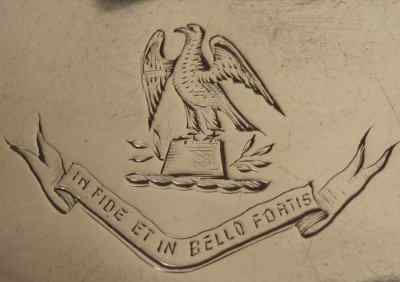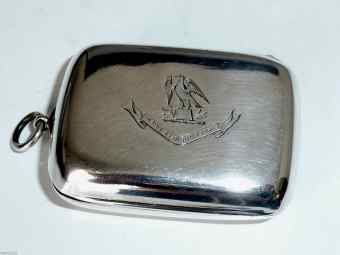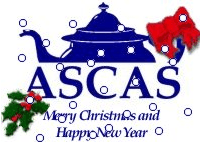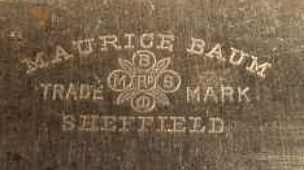YOUR GUIDE TO DECEMBER NEWSLETTER:
articles
new members
members' window
mail to ASCAS
replies to questions
a page per month
a silversmith per month
a word per month
a book on my shelf
a crest per month
contributors to this Newsletter
search engine
disclaimer and privacy policy
2016 ASCAS membership
No fees are requested for ASCAS membership.
Members still interested to ASCAS and its activity are invited
to send an e-mail to
confirming their 2017 membership (the simplest way is to
use the 'reply' button on our December e-mail).
I apologize for this little effort asked to whomever appreciates
and supports ASCAS activity.
No action is required to unsubscribe. Members not confirming
their membership will be automatically deleted from the sending
of our monthly Newsletter and will be suspended on
February 2017.
Please accept my best wishes for a happy Christmas and a
prosperous New Year.
Giorgio Busetto
ASCAS Secretary
A new article for ASCAS website

Katherine Palthey presents:
Marie Antoinette's Second Necessaire - Part 2

In 1791 the Queen of France Marie-Antoinette ordered an extraordinary "Necessaire" travelling case made by the Royal Cabinetmaker Jean Philippe Palma and Royal Silversmith Jean-Pierre Charpenat. This travelling necessaire is almost identical to her original case found in the Louvre. Part one of this article can be found in our listing, and explains a bit more in detail the provenance of this case and how it made its way to where it is now: The International Museum of Perfumery in Grasse, France. During our private meeting at the time, I had the immense honor of examining and photographing several important pieces from the Queen's Necessaire. In part 1 I shared with you a chocolate pot, a spirit burner and a toddy beaker and their respective hallmarks. In this part, I will share three more silver items that were examined: a pair of silver "bougeoirs de voyage" candlesticks for travelling; an entire set of toiletry jars with silver or vermeil "cache bouchons" bottle covers and a rare "clochette de service" royal service bell. As mentioned in the first article, there are over 50 pieces in this necessaire and it takes almost 2 1/2 hours to unpack the entire case...
click here

New members
Welcome to new ASCAS members:
Craig Baker - USA
Nick Duggan - England UK
Mail to ASCAS:
e-mail
silverassociation@yahoo.it
Piero Eduardo writes:
...I'd wish to have information about the "AO" maker of a GBD pipe hallmarked London 1918.
Thanks in advance for your help.
Best regards
Piero Eduardo
Mike Deshaies writes:
... I have learned quite a bit about hallmarks since joining your site several years ago and usually do not have to reach out for help.
I just got this Traubenpokal grape cup that is most likely circa 1600 and I am stumped on the marks. This covered cup consists of 5 different pieces and all have the mark that looks like 2 letter A's, (AA).
I believe this is the makers mark but information is too limited on the internet for makers this early.
Was wondering if you could help
Mike Deshaies
David Murray writes:
...I would appreciate some assistance with some Italian silver teaspoons, photos attached:
The spoons have attractive finials, with interesting engraving, one is engraved Bellagio. The hallmarks are different, the first has 800 in oval with maker's mark 32 and MI, I presume Milan. The second has the optional 800 Crowned head for 1872-1933, in irregular punch, and what looks like a maker's mark of a Lion rampant holding a sword, with 3 stars.
Can you assist identifying the makers, and offer an explanation as to why 2 identical spoons would have different marks, perhaps made during the transition period at end of 1933?
Thanks and kind regards,
David Murray
32MI identifies Messulam, a silversmith firm founded in 1884. Your spoons bear respectively the optional mark used until 1935 (Italia turrita) and the lozenge used from 1935 until 1943 c. (meaning that the spoons were made in different times).
I don't have information about the mark with the lion rampant. Possibly this mark was used by Messulam before 1935. After 1935 the firm used different marks, see my website at http://www.silvercollection.it/SILVERSMITHSMI1.html
By the way, Bellagio is little village near Como Lake.
Giorgio Busetto
Claudio Morelli writes:
... I'd wish to identify the maker of this spoon bearing the hallmark of Nizza (Nice) Assay Office 1803/1809 (French domination).
Any help will be highly appreciated.
Claudio Morelli
Luigi Masciullo writes:
... This holy water font bears two French import marks but, in my opinion, it is of Genoa manufacture during French occupation of early 19th century.
What do you think about?
Luigi Masciullo
The style suggests Genoa manufacture, and this hypothesis justifies the French import mark.
Any other suggestion will be welcome
Giorgio Busetto
Alan Yates writes
Unfortunately I do not have my Indian Colonial silver literature to hand.
However, in my opinion the silver mug is Indian Colonial, the maker Charles Nephew, and the marks are pseudo English marks.
Kind regards
Alan Yates
"A PAGE per MONTH"
In this column we presents a page obtained from makers'
brochures, books, auction catalogs, advertising or whatever
other printed paper, related to silver, that may be of interest
for ASCAS members.
The images will be published at a "low resolution" level and for
private and personal use only.
This column is published under the kind permission of Giorgio
Busetto's website

"A WORD per MONTH"
In this column we
present an abstract from a page of the "What is? Silver Dictionary"
courtesy of




|
UNIDENTIFIED MARKS ON BRITISH SILVERPLATE
There was no legal requirement to mark electroplated goods and any letter, symbol or number punched in silverplate wares is part of the individual trademark used by manufacturers to customize their own production.
The punches consisted usually of letters corresponding to the initials of the electroplater coupled to other letters (e.g. "EP" for Electro Plated or "S" for Sheffield) and symbols composing a sequence similar to that used by Assay Offices for sterling silver hallmarking.
The attribution of trade marks based on maker's initials is problematic given that various makers had often the same initials and no registration was due for this type of marks.
Usually the identification can rely on the exam of advertisements, catalogs, invoices and city directories but the whirling world of openings, closures, mergers, transformations that characterized the 19th century electroplating business in Sheffield and Birmingham has had the consequence that many trade marks of minor manufacturers continue to remain unidentified.... MORE...
|
"A SILVERSMITH per MONTH"
|
|
MAURICE BAUM - BAUM BROTHERS
Scarce information is available about this family business active in Sheffield from late 19th century until early 20th century.
Maurice Baum was active at Albert Works, 189-191 Norfolk St (1884-1900) and Mowbray St, Sheffield (1901-1904). The firm used the trade mark SILVERINE.
Sterling silver hallmarks were entered in Sheffield Assay Office in 1884 and 1893.
Maurice Baum (born 1848) died in 1894, but the firm survived his death (managed, presumably, by his widow Rachel as in 1899 the 'MB' hallmark continued to be present in sterling silver knives) until was succeeded by his young sons Louis (c.1876-1950) and David Baum (1877-1951), acting as Baum Brothers (c.1904).
Baum Brothers were active at 40 Nursery Street (1905), 154 Meadow Head, Woodseats...
more
|
"A CREST per MONTH"
CARROLL and O'CARROLL

|
The crest of Henry Carroll, Esq, of Ballynure, co. Wicklow and O'Carroll, Irish family
The crest is described as 'On stump of oak, sprouting a hawk'
The Latin motto is 'In Fide et in Bello Fortis' (Firm in faith and in war)
The crest was found on a little siver fob box, hallmarked London 1896, maker James Hirst, 45 Hanover Street, Islington


|
Closing our December 2016 edition of ASCAS Newsletter I hope
you have appreciated its content.
Your comments, suggestions and advice will be of great help.
My thanks to Mike Deshaies, Piero Eduardo, Sean Flynn, Robin Holmes, Luigi Masciullo, Claudio Morelli, David Murray, Katherine Palthey and Alan Yates for their precious contributions.
Giorgio Busetto
Secretary
DISCLAIMER AND PRIVACY POLICY
ASCAS is a community of people having a common
interest in antique silver.
It is a non-profit association without commercial links.
Membership is open to whomever has a true interest in
this subject matter.
ASCAS has no real property and no fees are requested nor
accepted from members.
ASCAS keeps in touch with its members only through
periodical newsletters, e-mails and web-site updating
and ignores and is not responsible for any other
activity pursued by its members.
Likewise, ASCAS is not responsible for opinions,
evaluation and images displayed, and in any form
published or supplied for publication, by its members
who, in any case, maintain the property of their works
and assure the respect of national and international
legislation about Intellectual Property.
ASCAS does not have the full addresses of its members (only
town, country and e-mail address are requested for
membership).
ASCAS handles and protects with care its members' e-mail
addresses, will not disclose the addresses to third
parties, will use this information only to reply to
requests received from members and for communications
strictly related to its activity.
These rules are expressly accepted by submitting the
membership request.
|
|
 newsletter
# 151 December 2016
newsletter
# 151 December 2016















































